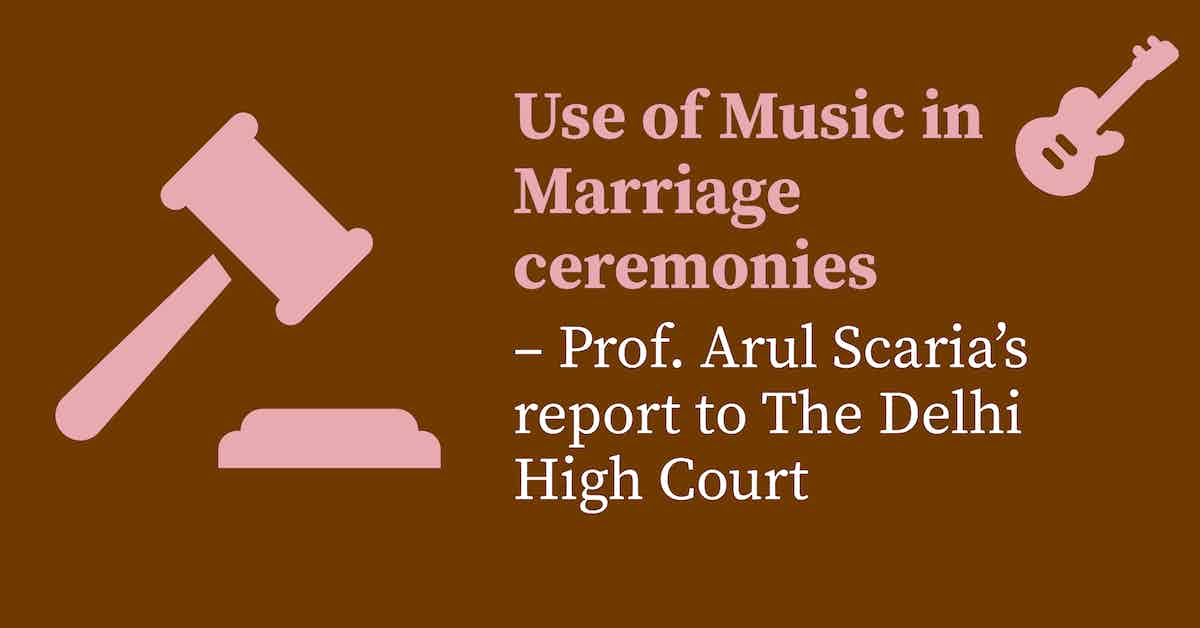In the case of PPL versus LOOKPART EXHIBITIONS (CS (COMM) 188/2022 & I.A 4772/2022), The Delhi High Court asked Prof.Arul George Scaria to provide an expert opinion on Section 52(1)(za). The Court asked Prof. Arul to particularly provide an opinion on the scope and extent of the Copyright Exception with respect to the use of Sound Recordings in marriage ceremonies and related festivities. In furtherance, Professor Arul gave his opinion to the Court, which was mentioned in the Court’s order on October 10th, 2022.
Summary of Prof. Arul’s Report
7. The current international legal instruments on intellectual property, particularly the Berne Convention for the Protection of Literary and Artistic Works, 1886 (“Berne Convention”), the Agreement on Trade-related Aspects of Intellectual Property Rights, 1995 (“TRIPS Agreement”), WIPO Copyright Treaty (“WCT”) and WIPO Performances and Phonograms Treaty (“WPPT”) provide sufficient flexibilities for the member states to provide exceptions and limitations that are fine-tuned to the local social, economic, cultural and legal requirements. The Indian copyright law has made use of the flexibilities available within the international copyright law framework, striking a fair balance between fostering incentives for creativity and ensuring adequate access to copyrighted works for the society through the various exceptions and limitations provided under the Act. S. 52(1)(za) of the Act is one such exception, which comes within the scope of ‘implied exceptions’/ ‘minor exceptions’/ ‘minor reservations’ allowed under the international treaties on copyright law. As per the TRIPS Agreement, the member states are required to submit their laws to the TRIPS Council to ensure that the provisions are in compliance with the TRIPS Agreement. India has submitted her copyright laws and no objections have been raised by any of the Member States on S. 52(1)(za). This may also be viewed as an affirmation that the Member States of the WTO agree that this provision is in compliance with the Berne Convention and the TRIPS Agreement.
8. S. 52(1)(za), including the explanation provided therein, warrants a broad reading in view of the legislative intention as well as the Indian socio, economic, legal and cultural context. The following specific aspects may be taken into consideration by the Court while adjudicating the scope of S. 52(1)(za). First, marriage is one of the most important social institutions in India and marriage ceremonies as well as the related festivities are given the highest importance by most communities in India. S. 52(1)(za) needs to be interpreted in a manner that protects and promotes the important constitutional right under Article 21 of the Constitution to perform marriage and engage in marriage related festivities in accordance with one’s own tradition and culture. Second, the existence of criminal remedies for copyright infringement, combined with the fact that copyright owners are not required to go through any formal examination system to claim copyright ownership over any subject matter, makes it important to limit the scope of rights of copyright owners in the context of official and religious ceremonies, and more specifically ceremonies and festivities associated with marriages. As copyright infringement is also now interpreted by the Supreme Court as a cognisable and non-bailable offence under S. 63 of the Act, a narrow reading of the provision may lead to potential harassment by police officers and copyright owners during one or more of the important ceremonies or festivities associated with marriage. Third, potential police intervention during marriage or any social festivities associated with marriage is also a potential threat to the right to privacy guaranteed under the Constitution.
9. As is evident from diverse case-laws and scholarly literature from different jurisdictions including India and the United States, the engagement of a facilitator who empowers a copyright user to exercise their legitimate user rights under copyright law or the commercial character of that facilitating entity, should not prevent the Court from allowing the exercise of a right provided under copyright law. In the absence of facilitators, most users in India may not be able to exercise their legitimate rights under S. 52(1)(za).
10. The Court may also examine whether the invitees to a marriage can be considered as “public” under the Act for the purpose of analysing whether there is a violation of right of public performance or right of communication to the public. While the Indian copyright statute does not define the term ‘public’, relevant case-laws suggest that ‘public’ has to be understood in accordance with the ‘character of the audience’. In the specific context of marriages in India, invitees are generally limited to those from family and social circles of the partners in the marriage. Hence, there may not be a violation of the right of public performance or right to communicate to the public.
11. Finally, a balanced copyright system necessitates drawing a delicate balance between the rights granted to copyright owners through exclusive rights and the rights provided to the society/ users of copyrighted works through limitations and exceptions. The social, cultural, historical, and legal context of S. 52(1)(za) warrants a balanced interpretation of the provision to ensure protection and promotion of social benefits.
You may access the complete report below:



